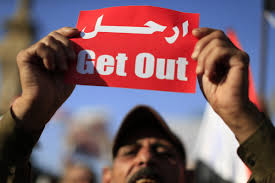 President Mohamed Mursi rejected an army ultimatum to force a resolution to Egypt’s political crisis, saying that he had not been consulted and would pursue his own plans for national reconciliation.
President Mohamed Mursi rejected an army ultimatum to force a resolution to Egypt’s political crisis, saying that he had not been consulted and would pursue his own plans for national reconciliation.
The Islamist leader described as potentially confusing the 48-hour deadline set by the head of the armed forces on Monday for him to agree on a common platform with liberal rivals who have drawn millions into the streets demanding Mursi’s resignation.
Members of his Muslim Brotherhood have used the word “coup” to describe the military manoeuvre, which carries the threat of the generals imposing their own road map for the nation.
But in a statement issued at nearly 2am, fully nine hours after General Abdel Fattah al-Sisi delighted Mursi’s opponents by effectively ordering the president to heed the demands of demonstrators, the president’s office used considerably less direct language to indicate he would try to take little notice.
“The president of the republic was not consulted about the statement issued by the armed forces,” it said. “The presidency sees that some of the statements in it carry meanings that could cause confusion in the complex national environment.”
Official video was released showing Mursi meeting the uniformed Sisi. Their body language seemed awkward, although it was unclear when it was shot.
The statement from Mursi’s office continued, “The presidency confirms that it is going forward on its previously plotted path to promote comprehensive national reconciliation … regardless of any statements that deepen divisions between citizens.”
Describing civilian rule as a great gain from the revolution of 2011, Egypt’s first freely elected leader, in office for just a year, said he would not let the clock be turned back.
But in referring to his plans for reconciliation as those he had spelt out before, he was speaking of offers that have already been rejected by the opposition, leaving it improbable that such compromises would bear fruit before Sisi’s deadline.
Mursi also spoke to U.S. President Barack Obama by phone on Monday, the presidency said in a separate statement. Mursi stressed that Egypt was moving forward with a peaceful democratic transition based on the law and constitution, it said.
A sense of disintegration in the administration since the protests on Sunday has been heightened by the resignations tendered by several ministers who are not members of Mursi’s Muslim Brotherhood. On Tuesday, the state news agency said the foreign minister, Mohamed Kamel Amr, had also asked to step down.
Attacks on Brotherhood offices have added to feelings among Islamists that they are under siege.
Some Brotherhood leaders, who swept a series of votes last year, said they would look to put their own supporters on the streets. After the destruction of the Brotherhood’s headquarters in a battle overnight on Monday in which eight people were killed, the possibility of wider violence seems real.
The Telegraph

Leave a Reply
You must be logged in to post a comment.